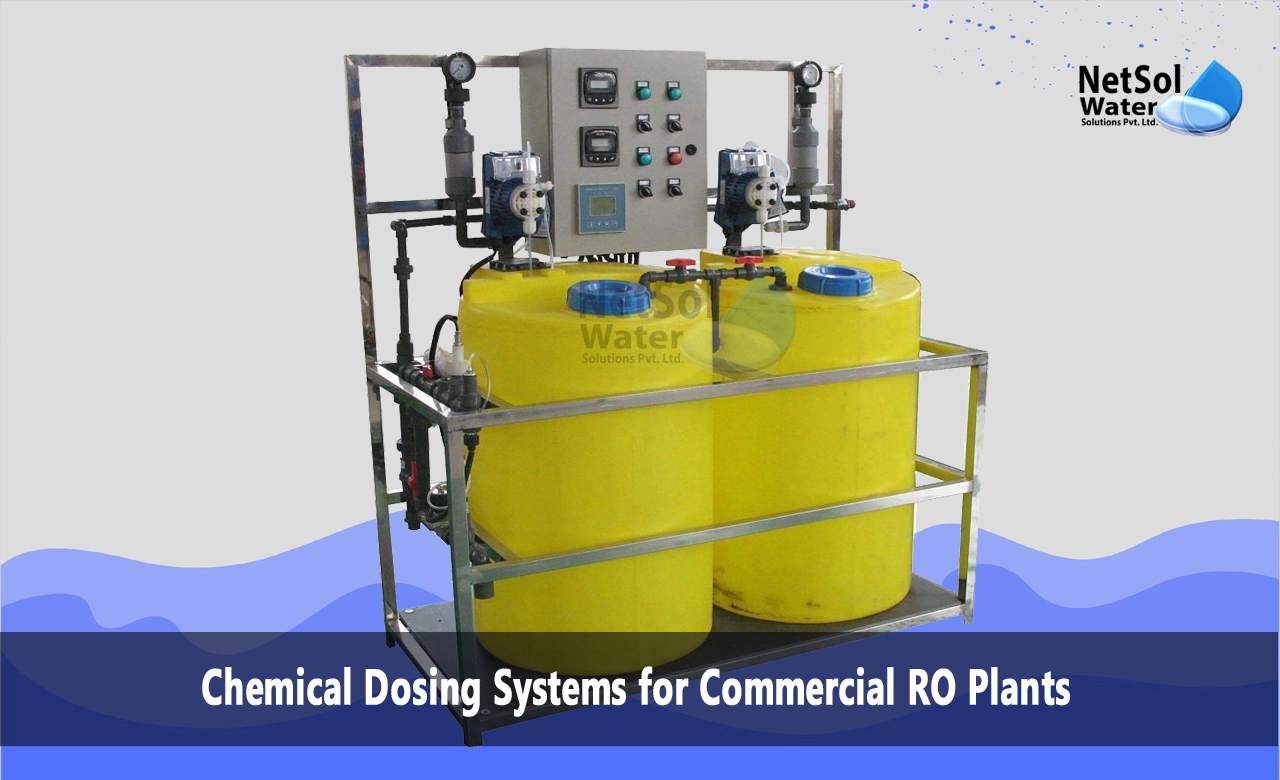Reverse Osmosis (RO) plants are widely used across various industries to purify water and remove contaminants. However, to ensure they function effectively over time, they need proper maintenance. Chemical dosing systems are essential for this upkeep, as they help prevent scale, control bacteria, and keep the membranes clean. With regular care and the use of these systems, RO plants can continue to provide clean, safe water for commercial and industrial purposes.
What are Chemical Dosing Systems for Commercial RO Plants?
A chemical dosing system is a specialized equipment that introduces precise amounts of chemical solutions into the RO system at specific points. It typically consists of chemical storage tanks, metering pumps, and a control panel. The chemicals used in dosing systems can vary depending on the application and water quality, with common chemicals including antiscalants, biocides, and dechlorinators.
These systems play a crucial role in maintaining the efficiency and longevity of RO systems by preventing scale formation, controlling biofouling, and protecting the membranes. Proper selection of chemicals and implementation of maintenance practices are crucial for maximizing the benefits of these systems and ensuring reliable production of high-quality purified water for commercial or industrial use.
The Importance of Chemical Dosing in RO Plants
Proper chemical dosing is essential for the efficient operation and longevity of commercial RO systems. Here are some key reasons why chemical dosing is crucial:
1. Scale Prevention: Scale formation can occur due to the precipitation of dissolved minerals, such as calcium and magnesium, on the RO membranes. Antiscalants are chemicals that prevent scale formation by inhibiting the crystallization of these minerals, thus protecting the membranes and extending their lifespan.
2. Biofouling Control: Biofouling is the accumulation of microorganisms, such as bacteria and algae, on the RO membranes. Biocides are chemicals used to control and eliminate these microorganisms, preventing membrane fouling and maintaining system performance.
3. Membrane Protection: Certain chemicals, like dechlorinators, are used to remove chlorine from the feed water before it reaches the RO membranes. Chlorine can damage the membranes and reduce their efficiency, so dechlorinators help protect the membranes and extend their lifespan.
Types of Chemical Dosing Systems
There are different types of chemical dosing systems used in commercial RO applications, each with its own advantages and limitations. Here are some common types:
1. Batch Chemical Dosing Systems: In these systems, a predetermined amount of chemical solution is manually added to the RO system at regular intervals. These systems are simple and cost-effective but require manual intervention and monitoring.
2. Continuous Chemical Dosing Systems: These systems automatically and continuously introduce chemicals into the RO system at a controlled rate. They are more accurate and efficient than batch systems but require more initial investment and maintenance.
3. Inline Chemical Dosing Systems: These systems introduce chemicals directly into the feed water line before it enters the RO system. They are commonly used for antiscalant and dechlorination applications and offer precise dosing control.
Factors to Consider in Chemical Dosing System Selection
Choosing the right chemical dosing system for your commercial RO application requires consideration of several factors, including:
1. Water Quality: The quality of the feed water, including its mineral content, pH, and the presence of contaminants, will determine the types of chemicals required and the dosing rates.
2. System Size and Capacity: Larger RO systems with higher feed water flow rates may require more sophisticated and automated dosing systems to ensure accurate chemical dosing.
3. Operating Conditions: Factors such as temperature, pressure, and system configuration can influence the effectiveness of chemical dosing and should be taken into account when selecting the appropriate system.
4. Regulatory Requirements: Certain industries and applications may have specific regulations or guidelines regarding the use of chemicals in water treatment systems, which should be considered when selecting a chemical dosing system.
Maintenance and Monitoring of Chemical Dosing Systems
Proper maintenance and monitoring of chemical dosing systems are crucial for ensuring their effective operation and the overall performance of the RO system. Regular maintenance tasks may include:
1. Checking and replenishing chemical solution levels in the storage tanks.
2. Calibrating and testing the metering pumps for accurate dosing rates.
3. Monitoring chemical consumption rates and adjusting dosing levels as needed.
4. Inspecting and cleaning the dosing system components to prevent clogging or fouling.
5. Regularly testing the water quality before and after the RO system to ensure proper chemical dosing.
Conclusion
Chemical dosing systems are really important for making sure commercial RO plants work well and last a long time. They help stop scales from building up, keep biofouling under control, and protect the membranes. This means the system runs smoothly, costs less to maintain, and doesn't need as much downtime. Choosing the right chemical dosing system and looking after it properly are key for getting the most out of it and making sure you always have good, clean water for your business or industry.
Netsol Water is Greater Noida-based leading water & wastewater treatment plant manufacturer. We are industry's most demanding company based on client review and work quality. We are known as best commercial RO plant manufacturers, industrial RO plant manufacturer, sewage treatment plant manufacturer, Water Softener Plant Manufacturers and effluent treatment plant manufacturers. Apart from this 24x7 customer support is our USP. Call on +91-9650608473, or write us at enquiry@netsolwater.com for any support, inquiry or product-purchase related query.



